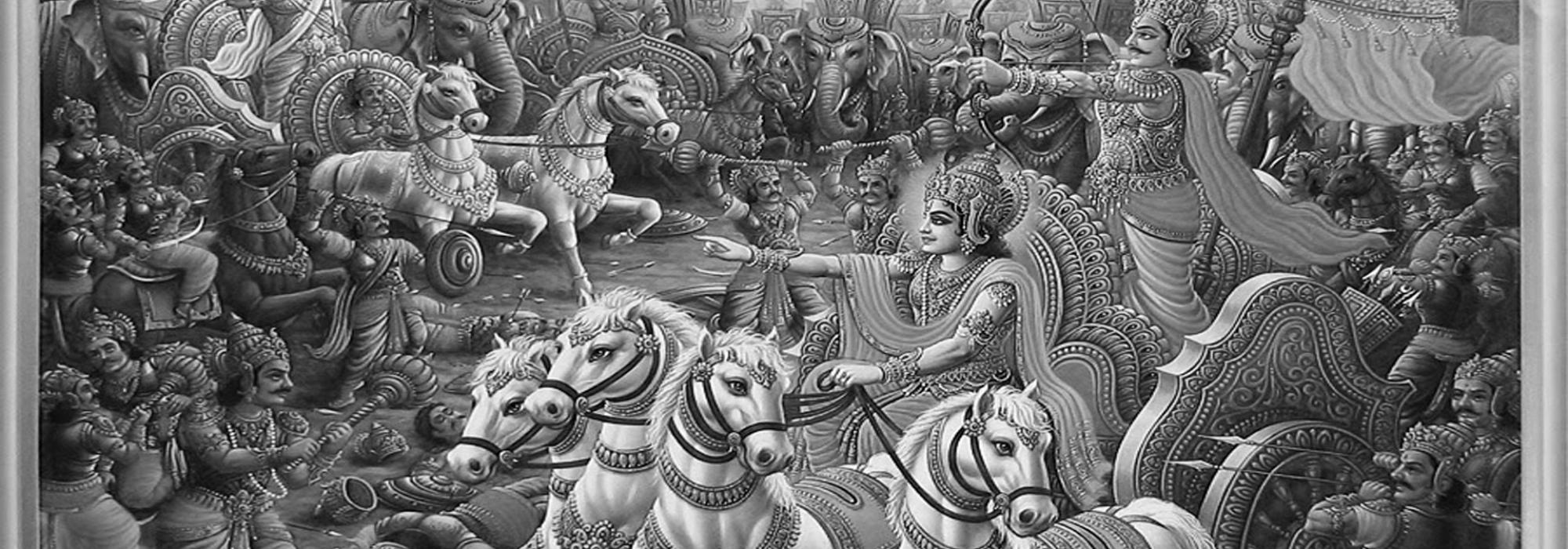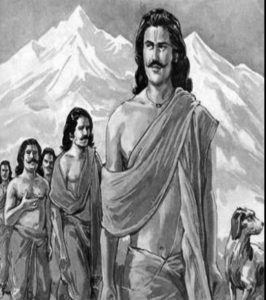The word ‘karma’ means ‘activity.’ In a narrower sense, it can also mean the Vedic rituals of yajña and yāga, building of socially useful amenities such as lake and ponds, and observance of pūjā and rituals that are prescribed in the Purāṇas, Smṛtis, and Āgamas. In common parlance, it also refers to a bad action that leads to sin. Yajñas and yāgas are mainly performed to please nature deities such as Indra and Agni. The performance of these will help a person gain ‘apūrva’ or ‘puṇya,’ which will raise him to svarga; he stays there until he spends his accumulated merit and comes back to earth after it is exhausted. Our ancestors believed this. In other words, according to this point of view, the joy of heaven was a result of good deeds on earth; bad deeds resulted in hell.
People of India had great belief in such activities leading to puṇya and pāpa, and the results that followed from them. Vratas and pūjā described in Āgamas and Purāṇas are of a much later time; these were not in practice during the time of the Mahābhārata. Let alone the results of pāpa and puṇya that we will get in the other world, has any one seen their effect in the current life? In general, it is believed that good deeds lead to good fruits and evil deeds lead to bad fruits. If one sows a mango seed, a mango tree grows and if one sows a neem seed, a neem tree grows. However, it isn’t evident that dharma always leads to happiness and adharma always leads to sorrow. It’s perhaps for this reason that Draupadī finds fault with Yudhiṣṭhira’s blind adherence to dharma. It is said that activities that give rise to supreme kinds of puṇya and pāpa bear result in the present life. What is the nature of this kind of puṇya? Are they the performers of yajña and pūjā? What is the nature of this kind of pāpa? What kind of evil deeds lead to such pāpa? In worldly terms we can go with the axiom, “परोपकारः पुण्याय पापाय परपीडनम्” – “To help others is good and to harm others is sin.” People who don’t have any faith in the performance of yajña and yāgas and who look down upon such rituals as paths of violence will have nothing against the above axiom. The philosophy behind it is ahiṃsā and love for all sentient creation; if this needs to be practised in reality, one will need to inculcate good qualities such as tyāga (letting go), satya (honesty), kṣamā (forbearance), and anasūyā (freedom from envy). These are classified as divine qualities (daivīsampad) in the Gītā –
अभयं सत्त्वसंशुद्धिः ज्ञानयोगव्यवस्थितिः।
दानं दमश्च यज्ञश्च स्वाध्यायस्तप आर्जवम्॥अहिंसा सत्यमक्रोधः त्यागः शान्तिरपैशुनम्।
दया भूतेष्वलोलुप्त्वं मार्दवं ह्रीरचापलम्॥तेजः क्षमा धृतिः शौचम् अद्रोहो नातिमानिता।
भवन्ति संपदं दैवीम् अभिजातस्य भारत॥(Bhagavad-Gītā 16.1-3)
“Courage, internal purity, pursuit of knowledge, generosity, self-control, spirit of sacrifice, study of scriptures (or a subject aligned to one's interests), austerity, sincerity, benevolence, honesty, freedom from anger, a sense of renunciation, serenity, not finding fault with others, kindness to all beings, absence of greed and fickleness, gentleness, modesty, radiance (and agility), patience, strength, cleanliness, and absence of malice and false pride – these are the qualities of a person of divine nature, O Bhārata!”
Suppose we inculcate such good qualities, will they lead to accumulation of puṇya and give us happiness? There seems to be a difference of opinion on this matter. Yudhiṣṭhira claims that adherence to dharma is his very nature and that one must not follow dharma with an eye on the results. Let us agree that for a person like Yudhiṣṭhira who had the nature of sattva that dharma was rather natural—just like it is natural for sugar to be sweet. Yet, is it wrong to have an eye on the rewards? Is it wrong to raise a cow for the sake of its milk? It seems that his opinion holds water in some sense. This is because if our goal is merely the result of adhering to dharma and not its process, we will become more and more attached solely to the fruit; the process of dharma might take a back-seat. This also may lead one to treading the path of adharma. Greed, corruption, excessive accumulation of wealth, etc. constitute such paths of adharma. In this context we must bear in mind yet another aspect, which is, it is not always true that whatever gives us happiness is the right thing to do. What is dear to us need not necessarily be good for us. Śreyas can also be preyas, just like the cow’s milk. At most times, however, śreyas and preyas are mutually exclusive; they might even be opposed to each other. Falsehood, cheating, and robbery might be dear to one; they are, however, not good for the individual and the society. They are not advisable for the present world or the other world. As the end result of these activities is not immediately visible, it might seem that the activities that are dear are also good. It may also appear that they don’t result in negative ends and that the people who follow such a path end up in happiness. It is due to this reason that humans take to such paths naturally. In reality, such activities do not give us permanent happiness. The joy derived from them is ephemeral. Moreover, for good deeds to bear fruits is like planting a seed and waiting for a coconut tree to grow (and give us sweet coconut water). It is so with bad deeds too. It is like sweet poison. Both these need time for the fruits to ripen. This is what happened to Duryodhana. In essence, it is difficult and slow to do something constructive; it is faster and easier to destroy; therefore the fruits of adherence to dharma are not immediately visible. What is more important to note is the kind of happiness and sorrows that a common person experiences although not having performed any great activity leading to either puṇya or pāpa. It is for this reason that people have doubts about the effects of puṇya and pāpa. The answer to this lies on the scale of different lifetimes, the results of our past actions. A person carries the seeds of pāpa and puṇya in his liṅga-śarīra (loosely translated as ‘subtle body’) and goes to his next birth. These seeds of puṇya and pāpa sprout in time according to their nature. Therefore it is hard to say the happiness and sorrows that one experiences in the current life are the results of the deeds of which one of the past lives. In that case, should we say that every one of the soldiers in the two armies adding to eighteen akṣauhiṇis, who died on the battlefield of Kurukṣetra had all accumulated similar karma in their past life all of which resulted in the same thing – Death? We perhaps have to answer in the affirmative.
As I wrote these words my conviction wasn’t strong in this regard. I was unsure if an entire army of eighteen akṣauhiṇis would perish in a mere eighteen days due to a similar acquired karma. I knew that earthquakes, volcanoes, and tsunamis could destroy a multitude of creatures in a short time. I also knew that millions die at a time in war. I was also aware of the effect that the atom bomb had in Nagasaki. The entire city was destroyed in a matter of seconds. But should I say that these are the result of the ripening of karma. Or should I say that these are divinely conceived? Or are these merely incidents aligned to natural laws? – Such doubts kept bothering me. Nevertheless, I handed over the manuscript for publication. A month after the book was printed, winter started. A large Banyan tree that faced my house underwent a complete transformation in a matter of fifteen days; even as the leaves were young and fresh, a fortnight later, they had withered away completely. Millions of leaves withered away and the tree stood almost barren. Looking at this, I thought – “Would this not work as an analogy for human beings too?” Man might consider himself to be a great being, however, in this timeless and eternal Banyan tree, man is nothing more than one of its many leaves. Keeping in mind, the broad perspective of the entire world, man, wherever he is, is smaller than the smallest atom.
Creation is similar to dissolution. In just a month, as spring came, the entire tree was thickly packed with new red sprouts filling it up completely within a matter of fifteen days. A tree that seemed to be almost lifeless now seemed to be full of life and brilliance. Where had his life-force hidden itself earlier? How did it come out? Which of the works of śāstra has understood in its entirety the laws of creation, sustenance and dissolution?
Good deeds and refined character are like the fragrance of a flower; the fragrance creates happiness all around. Bad deeds and wicked character are like the repugnant odour that emanates from filth. Results of the good deeds of the noble and bad deeds of the wicked are not limited to them; they influence others around them as well. This is true of the nature of joys and sorrows. In this manner, joys and sorrows of a person are not a function of his parents alone but also depend upon other people as well as the surroundings in which he lives. The noble traits of a person adhering to dharma create an environment of wellness and peace; the sinful acts of a wicked person cause great distress to his surroundings. A common man is like an oil-lamp; if one needs enough light to see in the darkness, several such lamps will be necessary. A brilliant person who is good-natured is like the sun or the moon and can single-handedly rid the world of darkness and also cause delight by providing immense light. When the moon is absent we have to rely upon the dim light of the stars; when they too are hidden behind dark clouds, we must depend upon the tiny lamps that we carry in our palms to find our way. With this in mind, we must never ignore the good qualities of a common man; those noble traits in the most ordinary of men are like the small lamps that come together to light our way when in need; several drops of water make a mighty ocean! Statements like the following from the Gītā infuse us with great confidence:
पार्थ नैवेह नामुत्र विनाशस्तस्य विद्यते।
न हि कल्याणकृत्कश्चित् दुर्गतिं तात गच्छति॥
(Bhagavad-Gītā 6.40)
“One who strives to do good never ends up in misery. Whether in this world or beyond, he never perishes, O Partha!.”
समोऽहं सर्वभूतेषु न मे द्वेष्योऽस्ति न प्रियः।
ये भजन्ति तु मां भक्त्या मयि ते तेषु चाप्यहम्॥
(Bhagavad-Gītā 9.29)
“I am equally present in all beings; none is hateful or dear to me. But those who worship me with devotion – I am in them and they are in me.”
भोक्तारं यज्ञतपसां सर्वलोकमहेश्वरम् ।
सुहृदं सर्वभूतानां ज्ञात्वा मां शान्तिमृच्छति॥
(Bhagavad-Gītā 5.29)
“One attains peace when he realizes that the purpose and the beneficiary of all forms of worship is the Supreme, the sole lord of the universe, and the true friend of all beings.”














































